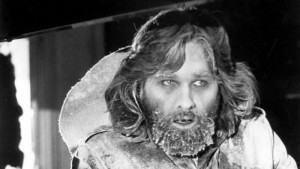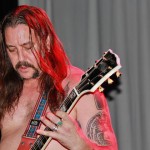As we hightail it out of the coldest February since the Hudson Valley started keeping records in ’49, and I stare out my window at a landscape still knee-deep in snow, it may be a good time to look back on those precious few moments of warmth, viz., the periodic injections of molten METAL which, like oil drums full of cortisone pumped into my every hinge and cranny, kept my spine limber and horns high.
*
The Chance theater in Poughkeepsie (Pug-KIP-see) was not the place to be on a single-digit night in mid-January. It’s a cardboard box, with flaps on four sides, and people kept opening and closing them for one reason or another, letting in all that cold, cold air. Almost everyone kept their jacket on. The re-entering smokers looked like Kurt Russell in The Thing:
Now, anything I can possibly say about High On Fire, that cold, cold night’s headliner, can be summed up in one detail: Matt Pike walked in out of the night and, before the door even shut behind him, pulled off his shirt. There we were, all of us huddled together in our coats, looking at the shirtless wonder that was Matt Pike. That’s commitment. That’s metal.
It behooves me to say something more about The Chance, this being my first time at the venue. What most stood out to me was the stark contrast between it and any of the City venues I’m accustomed to catching shows at—places as different as St. Vitus, Gramercy, and Best Buy. The Chance is probably more like the slogged-between rock clubs in Topeka and Flagstaff than anything sixty miles downriver, gritty and grungy Gramercy included. In fact, watching roadies’ legs pass back and forth beneath the two-thirds-dropped curtain branded with call letters of local radio stations, I couldn’t help thinking of The Blues Brothers playing “Rawhide.” It’s as different from the City as soap opera from primetime: a combination of the quality of light—a harsh, bathroomy light, the sort where nothing can be hidden, no band canonized by haze—and the quality of silence, noticeable between sets, is as unforgiving as the light. And so there is a raw, unfiltered quality to all sight and sound at The Chance.
When the bands play, the whole Chance throbs and buzzes like a Camaro.
In New York, clubs tend to feel bigger than they really are; The Chance feels smaller. Maybe that’s why what I took to be the door to the bathroom was actually the side door to the stage, and I almost joined openers Windhand there. And maybe that’s why High On Fire let the feedback ring between songs: to have a blanket of sound in this place where nothing can hide. Of course, anything smacking of blanketry was much to be welcomed on a night like this. But then there’s something about HOF’s sound that courts it anyway. Their hour-plus-long set was—quite literally—a seamless wall of noise.
They opened with “Madness of an Architect,” a perfect specimen of their giant, sludgy sound, a song built on a droning tonic scooped over and over up the neck; they closed with the by-now-anthemic “Snakes for the Divine”; they played “Rumors of War” and “Surrounded by Thieves” along the way. But the highlight of the set was the five (count ‘em) brand new songs: HOF were about to go back into the studio, and Pike said that, though they weren’t quite ready with the new material, he thought they were “pretty goddamn tight.” I would have to agree. And not just tight: you could tell they were jazzed about playing this stuff. Live, there’s always a tradeoff with brand-new material, for what is lost in the pleasure of anticipation—the sing-along, the this is my favorite part—has to be made up for in the excitement of being the first kid on your block to hear it. When it works, as it did here, it opens up a powerful hole in the set: a feeling of risk, a detour into the unknown, a vaudeville intermission—something Pike himself acknowledged with the words he used to seal off that part of the evening: “Now back to the regular program.”
HOF is the sort of band that makes you believe the road really can whittle and sand you down to the essence of rock-‘n’-roll. Pike played with one foot on and off the monitor like a gas pedal, all speed, sweat and tattoos. He’s got a new handlebar mustache, too, a la Hetfield or Lemmy. And while I’m on the subject of the rise and fall of facial hair: bassist Jeff Matz has grown an Ozarky beard to go with the practiced Melungeon stare. Beards do seem to be in with the metal crowd these days; not even drummer Des Kensel has managed to buck the trend.
There are few bands that can match HOF for raw power live, and that power—marvelously on display at The Chance that night—is as attributable to rumbling Matz and thundering Kensel as to Pike. But Pike is still the pointy end of this band; and, watching and listening to him that night, I realized something about his sound that is perhaps more broadly applicable to the sludgier and doomier metal bands of the last decade or so … although, as with so much, HOF does it better than most. His guitar has a timbre like a trombone. It’s not just the sound, but the way he uses the instrument, and the licks he writes. His left hand works like the trombonist’s on the plunger, all slides and slurs; the guitar might as well be fretless. His right hand gives the initial impetus, like a bellows-breath, and then the left hand, locked in 1-5 power-chord position, works up and down the fretboard. Meanwhile, the looseness of the strings—a combination of down-tuning and the fact that much of the sliding happens around mid-neck—means the notes balloon outside of their fretted little jails. The end product is that bloated, roughshod sound that characterizes High On Fire, a sound like deep brass.
*
I was back at The Chance two weeks later for the Napalm Death/Voivod et al. show. The temperature had eased up toward freezing, but a sleety snow started coming down around dusk, forcing The Chance to move the starting time up an hour, and leaving me hemming and hawing about whether to go out at all. It was one of those intergenerational love-in bills, six bands, a combination of elderly, middle-aged and retro-, equal parts alluring and quease-inducing. If there was an onball on this bill, it was definitely Voivod. And if there was any band I had to see, it was Voivod. And so Voivod it would be, even if it meant my Corolla piercing ice and snow like a veritable Princess of the Night.
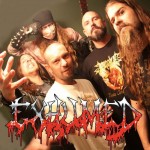 I missed the first three bands, including (most sadly) the perfectly-named Iron Reagan, fronted by the redoubtable Tony (Municipal Waste) Foresta, and made it just in time to hear what remains of Exhumed—Matt Harvey, basically, the rest of the band a stitched-together corpse—celebrate the re-recording of their 1998 debut Gore Metal. Exhumed dates from a time when I wasn’t listening to new metal, so I didn’t know what sort of a treat I was in for: Harvey’s perfect “Hetfield hunch” (think Nosferatu’s shadow) over his low-hanging mic; newbie Bud Burke (second guitar, an Explorer) rolling his eyes back to the whites while he headbanged, like my dog does when she’s dreaming. But by far the most attractive thing about Exhumed’s set was the unnamed mascot in scrubs, surgical mask, and bloody apron who periodically ran out onto and around the stage swinging a chainsaw over his head, pointing it now and again at the audience, a little like Maiden’s Eddie used to do. (Perhaps he, too, had mistaken the side stage door for the bathroom?) As a grand finale—more than shades of Alice Cooper here—said Eddie decapitated Monsieur Burke in a subcompact guillotine he rolled out onto the stage for that very purpose. But as he prepared the beheading—Sacrebleu!—the prop head fell onto the stage, and he was forced to retrieve it, and mime the whole thing over again, like a budget magician at a six-year-old’s birthday party. Then, as if enraged by the faulty prop or bungling executioner, Harvey gave a death-shriek so long and blood-curdling it would have made Death Angel’s Mark Osegueda jealous. The bouncers never even cracked a smile.
I missed the first three bands, including (most sadly) the perfectly-named Iron Reagan, fronted by the redoubtable Tony (Municipal Waste) Foresta, and made it just in time to hear what remains of Exhumed—Matt Harvey, basically, the rest of the band a stitched-together corpse—celebrate the re-recording of their 1998 debut Gore Metal. Exhumed dates from a time when I wasn’t listening to new metal, so I didn’t know what sort of a treat I was in for: Harvey’s perfect “Hetfield hunch” (think Nosferatu’s shadow) over his low-hanging mic; newbie Bud Burke (second guitar, an Explorer) rolling his eyes back to the whites while he headbanged, like my dog does when she’s dreaming. But by far the most attractive thing about Exhumed’s set was the unnamed mascot in scrubs, surgical mask, and bloody apron who periodically ran out onto and around the stage swinging a chainsaw over his head, pointing it now and again at the audience, a little like Maiden’s Eddie used to do. (Perhaps he, too, had mistaken the side stage door for the bathroom?) As a grand finale—more than shades of Alice Cooper here—said Eddie decapitated Monsieur Burke in a subcompact guillotine he rolled out onto the stage for that very purpose. But as he prepared the beheading—Sacrebleu!—the prop head fell onto the stage, and he was forced to retrieve it, and mime the whole thing over again, like a budget magician at a six-year-old’s birthday party. Then, as if enraged by the faulty prop or bungling executioner, Harvey gave a death-shriek so long and blood-curdling it would have made Death Angel’s Mark Osegueda jealous. The bouncers never even cracked a smile.
Okay. How do you reconcile the intensity of the music with the childishness of the spectacle—the guillotine with the shriek? It’s a disconnect inherent in the genre; it may even be genre-defining: between total commitment on the one hand and a refusal to take oneself seriously on the other; that invests itself and simultaneously stands outside and ironizes that investment. How can it be otherwise, in a genre that has managed to draw on both the spectacle of glam, Cooper, King Diamond, Gwar, and the (sometimes preachy) authenticity of thrash, grindcore and garage rock? One must take one’s laughter seriously. One must find a way to laugh seriously. I might think the spectacle silly, even distasteful, but I fear that, without it, our vaunted authenticity would disappear, too. And I don’t think the subgeneric drift of the last twenty-five years has troubled this contradiction at the heart of metal. It’s possible that the genre’s combination of vitality and longevity derives from the constant oscillation between these two poles.
Some twenty minutes after that climactic execution, Voivod took the stage with a polka version of “Ripping Headaches.” Who’d’ve thunk “Ripping Headaches” was a polka in disguise? Who broke out the Gogol Bordello? But what better way to celebrate an execution? Snake could have brought out his accordion. It was a measure of how far this band has come since the days of RRROOOAAARRR!!! … and it made me wonder why they bother to play this material at all anymore, except, perhaps, to give it such an unintentional stylistic makeover. The eponymous anthem “Voivod” I can understand; aging rock bands must constantly hail themselves in order to survive. But one price of being a band as eclectic and changeable as Voivod is deciding what part of your catalog you choose to hold onto thirty years down the road. Do you focus on what you’ve become, or how you got there? If you’re a butterfly now, why play larva? (No offense to War and Pain, one of the great debut albums—fuck it, one of the great metal albums of all time.)
The Chance set was pretty nearly what they played at Best Buy a few years back. “Voivod” went from opener to closer; “Overreaction” was substituted for “Tornado”; the wonderful “Prow” was added from the somewhat-underrated and little-heard Angel Rat. There was “Mechanical Mind” from Target Earth, and a brand new number called (pace Killing Technology) “We Are Connected,” which sounded very good indeed. But what with Target Earth making 20-best lists and ‘zines talking about Voivod’s return to their Voivodishness, it does make me wonder—as I have so often on this blog—why. Why only a couple of new songs? Why always that darn Floyd cover “Astronomy Domine” for an encore? Why go on tour at all? At the urinals after the set, Mark “Barney” Greenway from Napalm Death waiting his turn behind us, the guy peeing next to me raved about how seeing Voivod was just like being in college again; the only thing missing was a big, fat joint. He said this twice—big, fat, joint. And all I could think was that seeing Voivod in 2015 is precisely NOT like being in college again. In fact, seeing Voivod in 2015 reminds me that more than half a lifetime separates me from college. Outside, The Chance was smoothing over the between-set silence with side 1 of Moving Pictures. After Exhumed, it was Sin After Sin (with a bonus live version of “Starbreaker”). Seriously, how old did they think we were?
It may be that everyone else was more honest with themselves than I was, about being there for the nostalgia trip and the big, fat, joint. I admit that “Astronomy Domine” sounded good**, this despite the cheap interlude where Snake got people to clap for Piggy. Piggy who? Miss Piggy? I’m all for memorializing one of metal’s greatest guitarists (e.g., “Deulogy,” 1.4.11). Yet, Voivod are half a tribute band to themselves already. And while it might be too schematic to judge a band’s vitality by the ratio of new to old material they play, there’s a reason why “We Are Connected” was the unexpected peak of Voivod’s set, just like that string of brand-new songs High on Fire played a couple of weeks earlier.
If there was a saving grace to seeing Voivod in 2015, it was Away. Stage name of Michel Langevin, Away is the driving force of this band—one of two remaining original members, and the only one besides Piggy (R.I.P.) who never even took a break. Conceptualist, cover-and-sleeve artist, calligrapher, drummer … with Piggy dead, Blacky not touring, and Snake’s clownishness become almost too Vegas to watch—the little paunch, the bozo hair, the putty nose—how could I help but focus my attention on Away? But then that was easy: unlike any other drummer that night—any other drummer I can think of—he sat high atop his kit, and this had the effect of foregrounding him, and making of him a sort of cupola. Hair streaked with white, he looked not a little like the elder David Byrne. He was so effusive, so clearly transported by his role in making music; and this when there’s so much posturing in metal, and the older the band, the more transparent that posturing tends to be. Away sounded so fresh, he might have started drumming yesterday. There is a certain irony in this, for me. Though the perfect complement to the band’s sound, considered by himself, there’s always been something missing in his drumming: a little too flat a sound, a little too clubfooted a step to groove. Maybe it was the slower tempos, what with Exhumed and Napalm Death on either side; but at The Chance I found myself grooving to every little fill on his ride, every tricky hit and quirky syncopation.* Away is as imaginative, as original, and as full of flair on the drumkit as in his artwork; it just took thirty years and the loss of Piggy and Blacky for me to hear this.
If with the exception of Away Voivod are a shadow of their former selves, Napalm Death cast no shadow. There are no lights beyond blinding white, and God forbid there should be any props. They speak in the present tense; they know no other conjugation. The music is a blur, a throb, almost enough to buckle The Chance’s ornamental red columns and send the whole dev’lish club a-topple, Samson-style, on our heads. The way they approach their instruments, voice included, is … I’ll use the word impressionistic—; it reminded me of a set I saw at some Vision Festival late last century, where an electric harpist spent forty-five minutes throwing her body against her instrument from a variety of angles. No wonder—beyond the frenetic tempos—John Zorn would seek them out to jam with. Bass player Shane Embury, fat as a friar and sporting a frizzy near-tonsure, paws alternately at body and fretboard, creating no small part of that subsonic, club-shuddering roar. Drummer Danny Herrera holds his lefthand stick at midpoint for those blast-beats, dribbling more than striking. The result is a wall of noise, but a very different wall from High on Fire’s. As for Greenway, he roils before attacking with the business end of that angry caveman voice; between songs, he delivers political commentary in a polite Birmingham drawl. Five minutes in, his knee-high socks had rolled down to his ankles, revealing much-tattooed calves—the Brit equivalent of Pike’s discarded shirt.
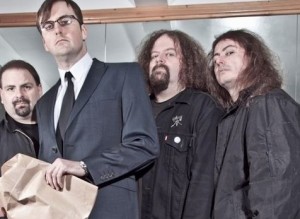 All told, Napalm Death had a there-ness no other band that evening approached—this though I freely admit I’ve always been a bigger fan of their politics than the full frontal assault of their sound, however of a piece they may be. Maybe it’s because the language of grindcore is still alive and well, or because its vocabulary is narrower, or because it’s a music you can play poorly, but just can’t phone in.
All told, Napalm Death had a there-ness no other band that evening approached—this though I freely admit I’ve always been a bigger fan of their politics than the full frontal assault of their sound, however of a piece they may be. Maybe it’s because the language of grindcore is still alive and well, or because its vocabulary is narrower, or because it’s a music you can play poorly, but just can’t phone in.
Snake thanked people for coming out on a Sunday. Greenway seemed to assume it. Snake wondered about the crowd’s energy, a little out of breath, though the crowd was at least as involved as with Napalm Death, who, once again, assumed it. Snake said he thought they’d been at The Chance like 20 years ago, while Greenway talked about the number of times they’d played there, and how it looked exactly the same as it ever did. Needless to say there’s a big difference between “I think I remember you” and “You haven’t changed a bit.” And there’s something not just vital, but moving about Greenway’s comment. With the exception of the Wackens and Eindhovens and perhaps the preposterous 70,000 Tons of Metal cruise, Napalm Death will never play a place bigger than this, they will never have a local following much wider than this room. And knowing Napalm Death is still at it, that noise is (in) their blood, was, together with Away—and maybe Chewy, too—dare I actually say this?—the most—wait for it—life-affirming (ugh!) thing about that evening.
Something to carry me home through the thickening snow. She was the Princess of the Night …
*
On the night of February 23rd, the temperature in New York plunged into the single digits (again), with a wind-chill in the negatives; and there I was, longjohnless and eating my scarf against the cold, trying to get out to Greenpoint, to be among the lost souls at St. Vitus. Smarter people—or perhaps more pious ones; there’s only so many times your desire to hear metal can be damned by the weather before you begin to wonder about the state of your immortal soul—would’ve stayed home; and smarter people clearly had: the cafes and restaurants I passed and ducked into were pretty barren. But then it’s not every day you get to hear legendary Slayer drummer (and once again, Zorn collaborator) Dave Lombardo live, now with his newish combo, Philm.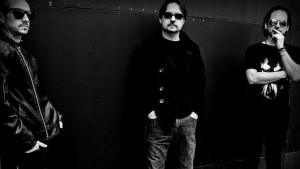
John Sayles’s Eight Men Out ends with the image of “Shoeless” Joe Jackson, the White Sox’s disgraced heavy-hitter, playing for a bush-league team. He’s the one we pity the most: the most reluctant or clueless about the bribe, the one who really played for the love of the game, honest as a dog. He pegs a homer; one of the men in the crowd swears he recognizes that swing; Buck Weaver (John Cusack), one of the old White Sox teammates, also in cognito, assures him he’s confused. Cue ending credits.
I couldn’t help but think of that Sayles movie, watching Lombardo drum away at St. Vitus. Going from one of the best-known and most durable thrash bands in the history of the genre to a band that depends on his name to garner attention … and certainly to get people like me out on a night like this. Four folks back, I could hardly see him for the sheer number of phones and camcorders held up by the metal paparazzi. Really, people—how many vids of Dave posted on YouTube do we need?
Not that there’s any scandal about Slayer (or any more than usual). Nor is it the first time Lombardo’s stepped out—he’s been more out than in since 1990. Nor, by the way, is Philm bush-league; I’ll get back to this. Nor—to trot out every reason why this is a thoroughly flawed (though seductive) analogy—has Lombardo disguised his identity. He couldn’t if he tried. He’s not trying. It sounded like him. And it wasn’t just the playful rhythmic quotations from Slayer. It was the reality and energy of his drumming, the shape of his fills, the sound of his ride, the athletic snare-hit, that batter’s swing—maybe this, more than anything, was what brought the Sayles movie to mind. Maybe, as happened with Away, it takes a new team to hear what makes Lombardo Lombardo.
Now that I’ve beaten one bad analogy to death, let me try a second. About halfway through the set, I started thinking of Hendrix, and whether Philm is Lombardo’s Band of Gypsys, Hendrix’s last, pared-back trio, more blues-oriented than the pop-rock of the Experience (although of course the Experience played its share of the blues). Because there’s something pared back and bluesy about Philm, too. More, there’s a new tightness that Lombardo can exploit the way Hendrix did the much more solid foundation of Cox-Miles (or at least Cox; the thing with Mitchell wasn’t a lack of musicianship, but the opposite: the (often exhilirating) desire to go head-to-head with Jimi). Greater precision in the whole means greater individual freedom to play.
Like the band’s music, Lombardo’s kit is pared back, too. No “Live Undead” rototoms, no double bass; this is drumming that gravitates around snare and toms, and, as so often happens when one limits one’s creative choices, it seems to have re-kindled his imagination. Philm is a more rhythmically colorful band than Slayer—a given, but it bears mentioning—and Lombardo’s beats tend to heavier syncopation and surf-punkiness. And then those perfect flourishes on the hi-hat and ride, the rim shots, and … wait: did I say “flourishes” to describe Lombardo’s playing? The king of speed, Slayer’s camshaft? Yes, I did. In case you’ve never heard him out of Slayer, Lombardo unbound is both finesse and smoking energy, a real joy to listen to and watch drum. I don’t mean flashy; this isn’t M. Crue or Q. Riot, he doesn’t hit himself in the head with one hand while he beats a tom with the other, none of that shit. It’s all in the swing: the way those drums need to get hit, just so, to make just that just-so sound. It goes back to Bad Analogy No. 1: the star athlete … perhaps even one just a little past his prime, who has no choice but to depend on grace as much as energy. Music has always been more forgiving this way than athletics, though never entirely, and metal least of all.
Given Bad Analogy No. 2, I was more than a little gratified when the band broke into “Purple Haze” for a not-quite encore—they huddled but never left the stage. The Hendrix turned into a medley with Beatles-cum-Aerosmith and Zeppelin. Classic rock! Medleys! Who plays medleys anymore? Philm does! Irony breathes new life into the deadest rock traditions. And yet, though Lombardo occasionally plays knowingly with Slayer, and though his very presence makes Philm a self-conscious band, they’re not a band that trades on irony. Medleys or no, I like this band. Quite a lot, actually. I like the way singer-guitarist Gerry Nestler’s dissonant, sometimes open-string arpeggios complement and color Lombardo’s heavy, dry hits. His soloing is strong and clear; his voice can do a nice Vedderish shriek; his stage presence meets Lombardo’s head-on; he even has hair like Jimi’s. Bassist Pancho Tomaselli is growly and tight. Together, they make Lombardo a great new pair of shoes. In them, he walks tall. They’ve got him pegging homers again, for a dazzled new crowd, and for the love of the game.
* I had a similar revelation some years ago with Al DiMeola’s Land of the Midnight Sun. DiMeola was my guitar hero in the ‘80s, and Land of the Midnight Sun is a guitar-hero album. After a long hiatus and a lot of jazz, I put on that record and realized I’d forgotten to listen to Lenny White on drums. And all of a sudden that became a whole new record.
** It’s clearly not about playing covers per se. Napalm Death played a balls-out version of the Kennedys’ “Nazi Punks, Fuck Off”; Exhumed played Madball’s (?) “Ready to Fight.” Of course, a cover has many functions, not the least of which is to declare affiliation with a certain tradition; it says much that Voivod’s cover is psychedelic/art rock, while the other two are punk/hardcore, to which underground metal has always looked to authenticate itself. Placement also matters, i.e., playing a cover as an encore or ender versus anywhere else in a set. That said, there’s something ironic and depressing about the fact that, for a band as utterly original as Voivod, their best-remembered song is a cover. (Remembering that the band tried to resuscitate their flagging career in ’93 by covering “The Nile Song” is yet more depressing; it’s a track that weighs like a stone on the otherwise bubbly Outer Limits.) It brings to mind Harvey’s (of Exhumed) little the-metal-chuch-accepts-many-faiths speech, calling Voivod and Napalm Death their “heroes,” saints in different nooks. The Chance’s balcony that night was cluttered with equipment, and I can only imagine the accommodations were similar, everybody piled on each other like cats, their take-out orders all mixed up, Foresta’s Taco Bell with Greenway’s organic kale salad. And as long as piling is the theme of this footnote: although I really focus on Away above, Chewy (Dan Mongrain), who replaced Piggy on guitar in 2008, deserves a special mention. He isn’t just a wonderful Piggy impersonator, necessary and difficult as that is. He’s found his own stride, and helped revive a largely moribund band after two mostly forgettable, necrophilic (no matter how welcome) efforts by Jason Newsted to do the same. Kudos, Chewy. Give my love to Han.

